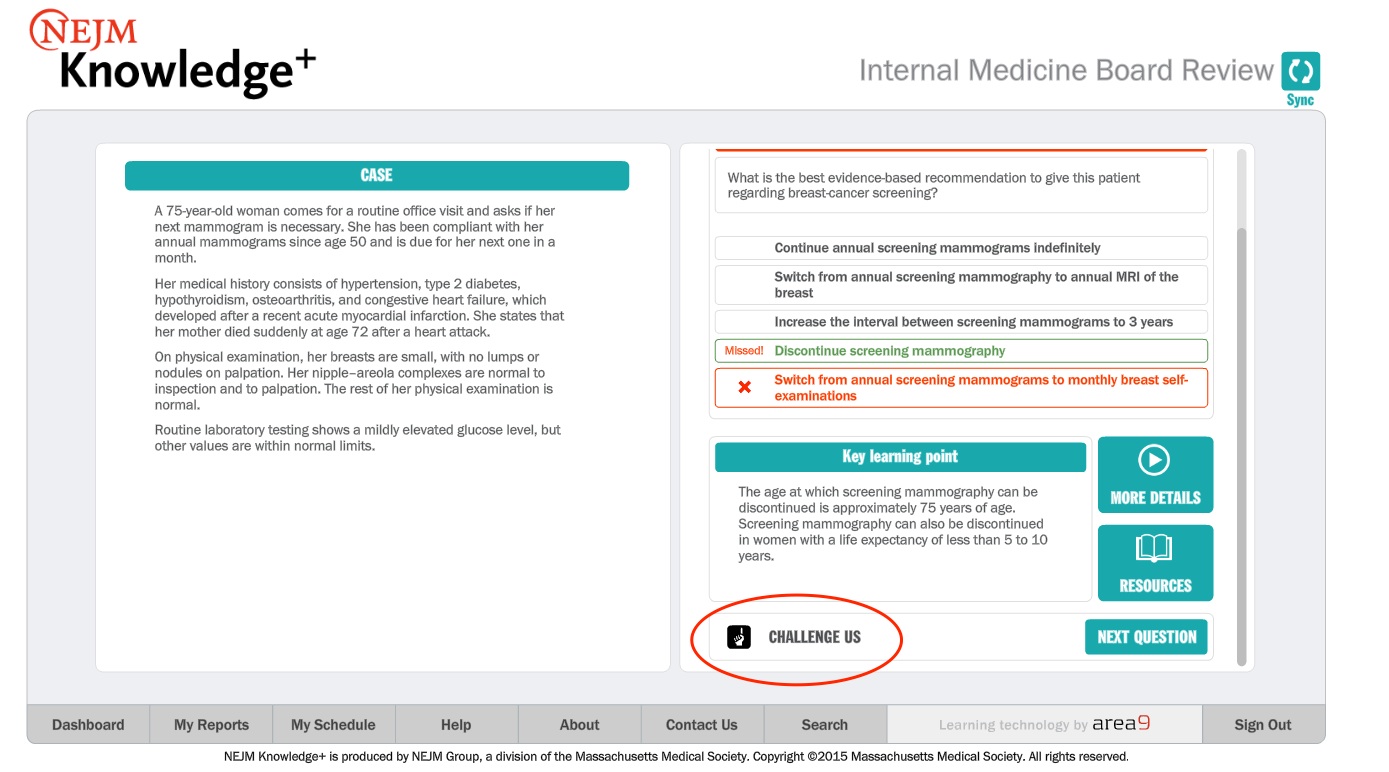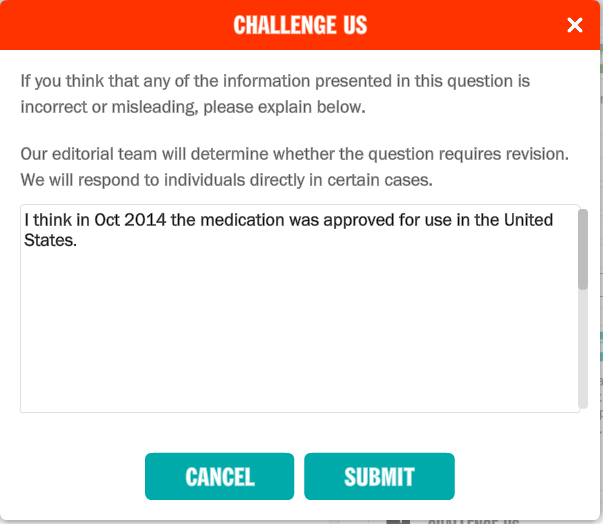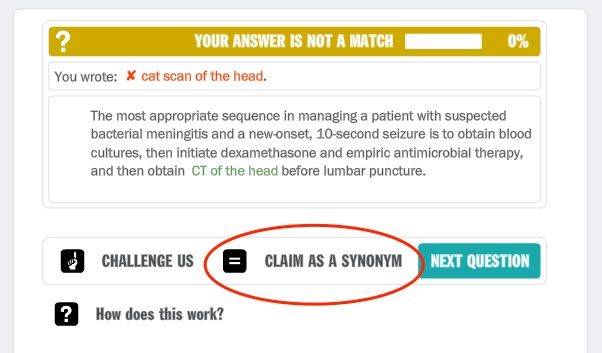“Challenge Us” is what I like to think of as a super-feature of the NEJM Knowledge+ platform.
In other blog posts on this site, we’ve explored how our adaptive learning system acts as a master teacher and allows people to understand the gaps in their knowledge and fill those gaps with current information that is relevant to their practice, as well as how they can earn CME points and receive performance data in real time.
Challenge Us is a small button found on every question in the product, sitting there innocuously at the bottom of the screen — but its power is enormous, and thus far, under-celebrated.
The Challenge Us process for the learner is remarkably valuable for three reasons:
- It provides you with an opportunity to tap into your desire to learn (in this case, not in a classroom but with an adaptive system and a responsive educator on the other side of the screen). And when you are motivated, you are more likely to pay attention and learn.
- It allows you to give impromptu feedback and ask questions that are directly related to a particular learning point — the one you are thinking about right now. And when you are emotionally engaged in the content, you are more likely to remember what you’ve learned later.
- It offers you a way to receive answers to your burning questions or a way to influence the accuracy of the content that is authentic and restorative. And when you have a back-and-forth with a real person, you feel grateful that you have been heard and you are interested in receiving the teacher’s reply.
Motivation
In the early elementary grades, motivation to learn is high, driven by our intrinsic yearning for new skills and information. As we get older, the structured and repetitive nature of schooling can dull this internal motivation — and we often become driven by extrinsic rewards, such as grades, praise from our parents and teachers, and the knowledge that being a diligent student will lead eventually to reaching the goal of focusing entirely on what interests us most. For most readers of this blog, that’s probably the study and practice of medicine. At the point that you’re engaged in learning medicine, you learn for learning’s sake, and you are intrinsically motivated.
Yet, once you become a clinician in practice, your motivation to keep up with medical knowledge may again turn extrinsic at times: your goals may be limited to earning enough CME to remain professionally licensed or to passing an exam or to provide information to your colleagues in a presentation. These external motivators are powerful drivers when your engagement in the learning would naturally be low. Once again, the formats for learning can become boring and repetitive.
But a great teacher — one who invites you to participate fully in the learning process — can break the mold.
Emotional Engagement
Countless studies have shown that you will learn and remember the most when you are emotionally engaged in the process. Conversely, one of the worst ways to learn is to be a passive recipient, unengaged with the content.
Research shows that a teacher who circumvents students’ boredom by engaging them in challenging tasks increases their skills. Great teachers also know when to dial down the difficulty to avoid student anxiety.
A study in the Journal of Cross-Disciplinary Perspectives in Education reports on the phenomenon of attaining “flow,” during which a learner reaches
…an optimal state of immersed concentration in which attention is centered, distractions are minimized, and the subject enjoys an autonomous interaction with the activity…People in a state of flow report a disassociation with time, a lack of recognition of hunger or fatigue, and they report that their skills are well matched to the requirements of the task (Whalen, 1999).
This nirvana of learning is often reserved for activities for which you have a deep passion.
How Challenge Us Motivates and Engages You
Clicking “Challenge Us” allows you to tell us if you feel that a question is incorrect or misleading in any way. And you don’t have to get a question wrong to challenge us. You might
- point us to a new study on the topic,
- remind us of a nuance in the case we presented,
- explain why you think our correct answer is actually incorrect, or
- ask us to explain in more detail why the answer you chose was incorrect.
Another way to interact with the content in NEJM Knowledge+ is the “Claim as a Synonym” button that appears in every fill-in-the-blank question. This feature, similar to Challenge Us, allows you to tell us if you think the answer you submitted is synonymous with our correct answer.
For example, users have now given us at least 15 different ways to describe a CT scan of the head, including shorthand like “head CT” and more formal phrases like “computed tomography of the head.”
All of these types of comments reflect a high level of intrinsic motivation to learn and engagement with the material.
How Challenge Us Allows You to Interact with Real People
The NEJM Knowledge+ editorial team reviews every user challenge and synonym request that comes in through the Challenge Us and Claim as a Synonym buttons. We are excited to hear from users who are engaged and motivated in their learning.
Our response might come as a surprise to some users, who expect that their comments flow into the ether. One person, upon receiving a reply to his challenge from a member of our editorial team, replied back, “Wow, thanks for your response!…Now that I see that you guys actually read the comments, I will ensure my comments are clearer and hopefully more useful.” We really appreciate that.
Some challenges are very straightforward for us to address — like a blurry image or a discrepancy between two different elements of the same question. Others require a subject-matter expert to weigh in. Our reviewers include general internists, pediatricians, and family practitioners as well as specialists in every field of internal medicine; all of these individuals are actively practicing medicine and are committed to engaging with users over challenging content.
Here are three examples of editorial changes we’ve made in NEJM Knowledge+ questions recently as a result of user challenges:
- In a question about the best timing to initiate antiresorptive therapy in a patient who has just sustained a major fracture from low-energy trauma, our correct answer was to initiate bisphosphonate therapy in several weeks. However, users questioned this timing, and our reviewers confirmed that it is indeed a controversial area. In response, we have modified our correct answer to focus on initiating therapy within 90 days, consistent with the results of the HORIZON trial.
- One of our most challenged questions is about consent for HIV testing in a patient who is not able to consent for herself. Several users commented that the issue of consent for HIV testing is state-specific and therefore not appropriate for inclusion in a general question bank. We agree and have withdrawn the question from NEJM Knowledge+. The Center for HIV Law and Policy provides a summary of state-specific laws related to HIV testing.
- In a question about treating insomnia in an overweight patient with newly diagnosed major depressive disorder, we noted that a sedating antidepressant was an appropriate choice for initial management and specifically listed mirtazapine as the correct answer. Users pointed out that mirtazapine has been associated with weight gain and is not an appropriate choice for a patient who is already overweight. We have revised the question accordingly.
We keep a running list of content updates here — and we regularly communicate with individual users about the challenges they’ve logged.
So Go Ahead and Click that Challenge Us Button
It is a powerful tool, affording you the chance to raise your hand and speak up just at the moment when you are most motivated to learn and engaged in the content. Maybe you’ve even attained “flow” and have forgotten what time it is or whether you’ve eaten dinner. At that moment, when you’ve caught a mistake, remembered a new study, or are puzzled by an aspect of the case we haven’t addressed in the detailed feedback, hit that Challenge Us button, knowing that on the other side of the screen are real people reading every comment and question who are invested in making this the highest quality medical adaptive learning platform out there.
More from the Learning+ Blog on NEJM Knowledge+ features:
Progress and Proficiency in NEJM Knowledge+: How Are We Doing?
Recharge: What It Is, How It Works, and When to Use It





